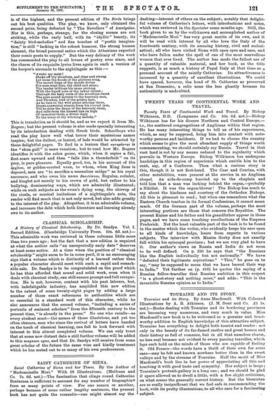TWENTY YEARS OF CONTINENTAL WORK AND TRAVEL
Twenty Years of Continental Work and Travel. By Bishop Wilkinson, D.D. (Longmans and Co. 10s. 6d. net.)—Bishop Wilkinson has for his diocese Northern and Central Europe,- i.e., the scattered congregations of Anglicans within that region. He has many interesting things to tell us of his experiences, which, as may be supposed, bring him into contact with note- worthy persons and incidents. If we had to choose the country which seems to give the most abundant supply of things worth commemorating, we should certainly say Russia. Travel in that vast land is not by any means reduced to the regularity which prevails in Western Europe. Bishop Wilkinson has undergone hardships in this region of experience which entitle him to the rank, say, of a Confessor. Then what a curious story is this, though it is not first-hand. The Czar and Czarina, with other notabilities, were present at the service in an Anglican chapel. An aide-de-camp hurried up to the chaplain and told him that a man was lurking behind the organ,—probably a Nihilist. It was the organ-blower ! The Bishop has much to say about the kindness and courtesy of the Orthodox Bishops. All this is pleasant to read ; but when one remembers what the Eastern Church teaches in its formal Confessions, it cannot mean much. Of the German part of the volume, perhaps the most interesting portions are those that concern the Royalties. The present Kaiser and his father and his grandfather appear in these pages, and we have some touching recollections of the Empress Frederick. Not the least valuable part of the book is to be found in the matter which the writer, who evidently keeps his ears open to all kinds of knowledge, hears from experts in various subjects. The interview with Maxim Gorky does not exactly fall within his episcopal province ; but we are very glad to have it, Our author's views on Russia and India do not seem to be well defined. On p. 250 he says that "the Russians like the English individually but not nationally." We have "defeated their legitimate aspirations." "This," he goes on to say, "may be supposed to mean that we have barred their way to India." Yet further on (p. 416) he quotes the saying of a Russian fellow-traveller that Russian ambition in this respect "is a ghost-story and nothing more," and adds ; "This is the invariable Russian opinion as to India."






















































 Previous page
Previous page